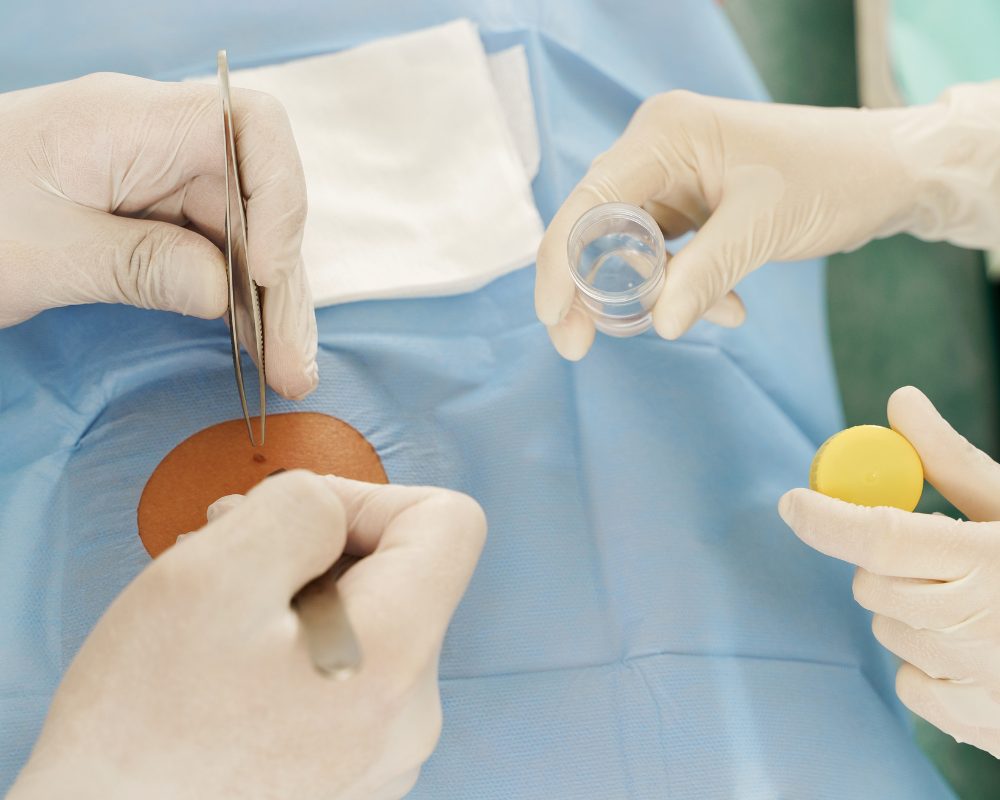Skin Biopsy Test and Parkinson’s disease
For patients with Parkinson’s disease, an accurate diagnosis is crucial for effective management and treatment. Traditionally, diagnosing PD involves clinical evaluation of symptoms, such as tremor, slowness, and balance problems. A recent advancement helped to improve diagnosis accuracy is the Syn-One Test. Understanding and accurately diagnosing neurodegenerative diseases such as Parkinson’s disease, dementia with Lewy bodies, or multiple system atrophy poses significant challenges.
The Syn-One Test utilizes a small skin biopsy to detect the presence of abnormal alpha-synuclein, a protein associated with PD. This protein tends to accumulate in the nerve fibers of patients with Parkinson’s. By examining skin samples from specific sites, such as the leg or back of the neck, this test can identify these protein deposits.
In this video, Dr. Kumar explains what the Syn-One test is, how the procedure is performed, and its ability in helping to determine a Parkinson’s disease diagnosis and differentiate it from other movement disorders.
Procedure
The testing process is relatively simple where a healthcare professional will collect tiny skin samples under local anesthesia (injecting a small amount of freezing into the skin), ensuring the process results in minimal pain. Generally, only a small band-aid is applied on each of the three biopsy sites; only rarely is a suture needed. These samples are then analyzed in a specialized laboratory to detect the presence of abnormal alpha-synuclein.
The Syn-One Test offers numerous advantages. It can confirm a PD diagnosis during its early stage, facilitating prompt treatment and symptom management. Additionally, it assists in distinguishing Parkinson’s disease from conditions that simulate PD. Moreover, it serves as a tool to identify other Parkinsonism disorders such as MSA and DLB, which involve alpha-synuclein aggregation in the brain or skin.
Research
The Syn-One Test has shown >95% sensitivity and specificity in a recent NIH-backed, prospective, multicenter, blinded study involving 428 patients, along with findings from other studies published within the past five years.
Across synucleinopathy subtypes such as Parkinson’s disease, Multiple System Atrophy, Dementia with Lewy bodies, and pure autonomic failure, sensitivity ranged from 93% to 100%.
This high degree of precision offers healthcare providers and patients a novel means to enhance diagnostic certainty and confidence, thereby aiding in the formulation of appropriate treatment strategies.
Click Here to Read About the Syn-One Research Study
Conclusion
For patients and their families, this test marks a significant advancement in diagnosing Parkinson’s disease, potentially enhancing outcomes and quality of life. Accurately diagnosing patients is crucial for advancing clinical trials and developing investigational treatments, ultimately aiming toward a cure for Parkinson’s disease.
Always consult with your healthcare provider to determine if the Syn-One Test is right for you.
Skin Biopsy Test and Parkinson’s disease

For patients with Parkinson’s disease (PD), accurate diagnosis is crucial for effective management and treatment. Traditionally, diagnosing PD involves clinical evaluation of symptoms, such as tremors, stiffness, and balance issues. However, recent advancements offer a more precise method: the Syn-One Test by CND Life Sciences.
The Syn-One Test utilizes a small skin biopsy to detect the presence of abnormal alpha-synuclein, a protein associated with PD. This protein tends to accumulate in the nerve fibers of patients with Parkinson’s. By examining skin samples from specific sites, such as the neck, thigh, or ankle, the test can identify these protein deposits. The procedure is minimally invasive. A healthcare professional will collect tiny skin samples under local anesthesia, ensuring the process is virtually painless. These samples are then analyzed in a specialized laboratory to detect the presence of phosphorylated alpha-synuclein.
The Syn-One Test provides several benefits. It can confirm a PD diagnosis in its early stages, even before significant symptoms appear, aiding in timely intervention. Additionally, it offers a more objective and reliable diagnostic method compared to traditional clinical evaluations.
For patients and their families, this test represents a significant step forward in understanding and managing Parkinson’s disease, potentially leading to better outcomes and improved quality of life. Always consult with your healthcare provider to determine if the Syn-One Test is right for you.
